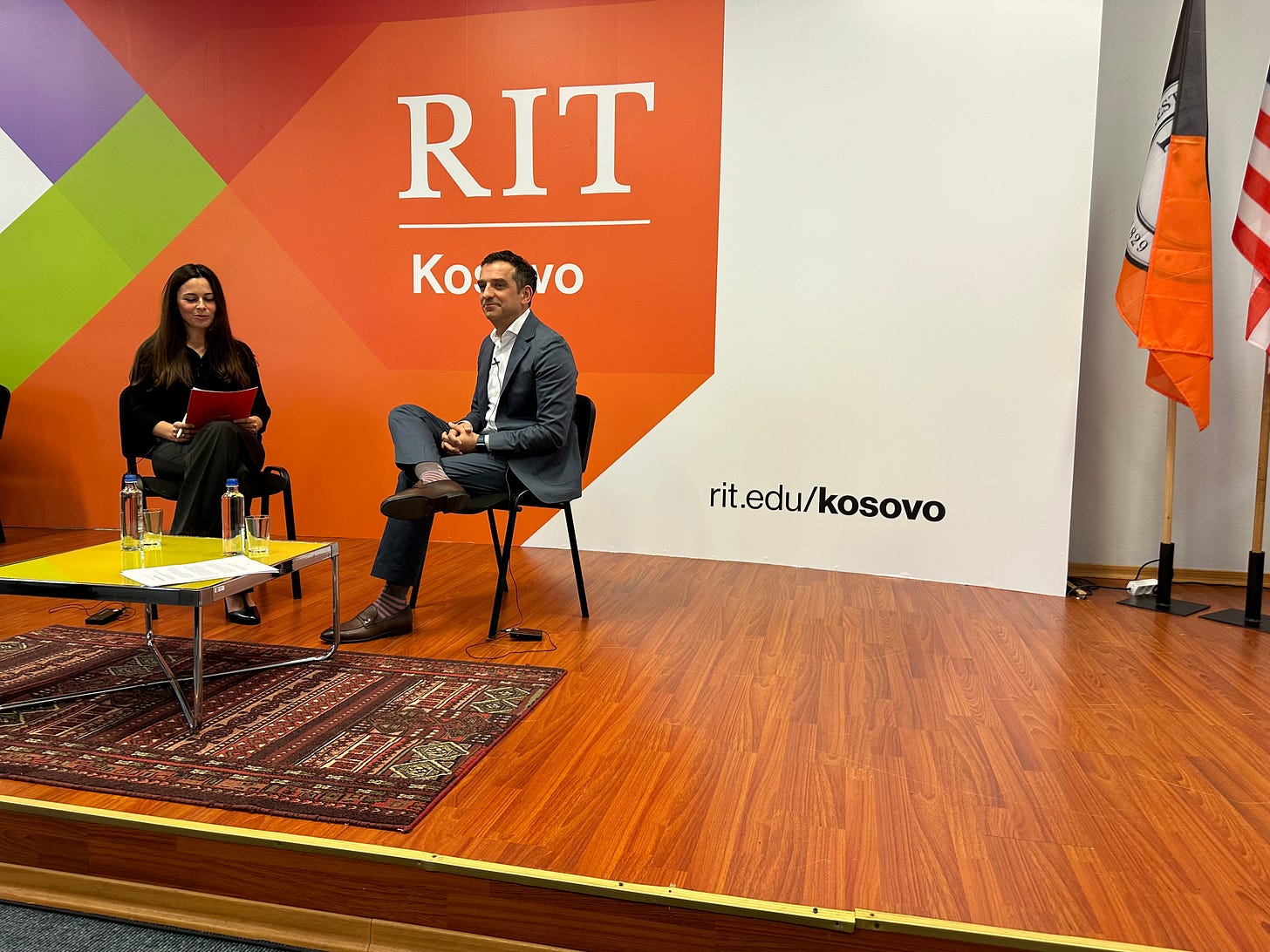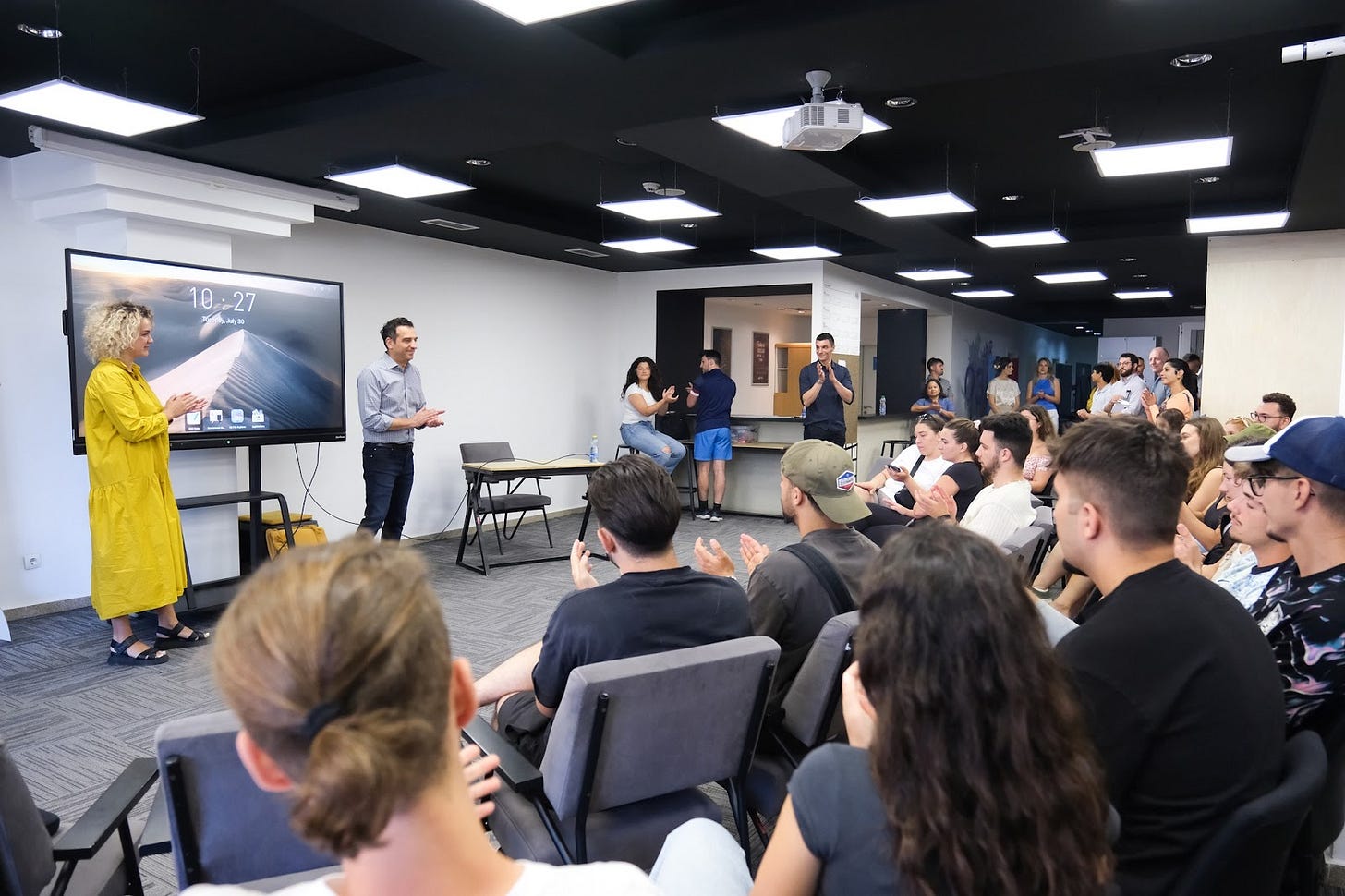From Nation Building to a Start Up Nation
The Special Competitive Studies Project is thrilled to announce that the Honorable Jennifer Granholm (Secretary of Energy) and Dr. Eric Schmidt (Chair of SCSP) will deliver remarks at the AI + Energy Summit, as well as a special message from Bill Gates (Chair, Gates Foundation). We look forward to seeing you there on September 26!
Hello, I’m Ylli Bajraktari, CEO of the Special Competitive Studies Project. In today’s edition of our newsletter, Hina Gir and I discuss our observations from a recent trip our team took to Kosovo, where local tech ingenuity and American assistance have given rise to a start up nation and a new tech powerhouse.
The Rise of a New Start Up Nation
In the heart of Southeast Europe, the young nation of Kosovo continues to flourish, a testament to the indomitable spirit of its people and – importantly – 25 years of determined American backing. In many ways, Kosovo stands as the most successful case of American-led nation-building efforts since the Korean war – a vibrant democracy with a free market economy, strengthening rule of law, independent media, and a staunchly pro-Western population that yearns for membership in the European Union and NATO. To be sure, Kosovo still faces many challenges – high unemployment, corruption, and a constantly looming security threat from neighboring Serbia. But relative to the challenges facing Haiti, Bosnia, Afghanistan, Iraq, and Libya – the other cases of nation-building – Kosovo stands out as the most consolidated democracy. Most interesting perhaps is that 25 years after its liberation, Kosovo is emerging as a tech start up nation – a strong source of tech talent, an active factory of cost- and quality-competitive software, and an early adopter of artificial intelligence (AI). In two visits to Kosovo, in 2023 and 2024, we observed this transformation first hand. Importantly, we observed that this success story had two critical ingredients: first, young people well attuned to key tech developments in the United States, and, second, early and sustained backing by the U.S. government. These twin dynamics are not only helping reinforce Kosovo’s democratic consolidation, but also offer some important insights on what an effective U.S. foreign assistance program could look like, particularly as technology and innovation become the battleground of the competition between democracies and autocracies.
A Quick History
For those who may not be as familiar with Southeast Europe’s geography, Kosovo is situated equidistantly between Rome and Istanbul, an approximate 90 minutes flight from each. Its geography has been its destiny. It has suffered through nearly every expansionary ideology – the Roman empire, the rapid migration of Slavs from present day Russia, Islamization by the Ottoman Empire, Fascist occupation, brutality of Communism, and in late 1990s an ethnic cleansing campaign waged by then Serbia’s dictator, Slobodan Milosevic. This traumatic history finally came to an end in 1999, when the United States led a humanitarian intervention, deployed a peacekeeping force, and – along with European allies – guided Kosovo towards independence in 2008. American military muscle has been critical, but so has been the development aid. Throughout the past 25 years, the United States has provided over $2 billion to Kosovo to foster democracy, build its institutions, strengthen its civil society, improve its rule of law, develop its economy, and cultivate its independent media. America’s generosity has not been in vain; in addition to its democratic progress, poll after poll show Kosovo as the most pro-American nation in the world and successive governments have fully aligned their foreign policy with that of the United States.
From a War-Torn Nation to a Startup Nation: The Rise of Tech Entrepreneurship
In recent years, Kosovo’s progress has taken an interesting twist. Kosovo has begun to emerge as a tech powerhouse in a region that still lags behind much of Europe on key development indicators. At the core of this tech revolution lies Kosovo’s greatest asset – a young and ambitious workforce. Born in turmoil and the aftermath of conflict, they tend to exhibit a survivalist hunger for opportunities and progress, and have quickly moved to acquire knowledge and develop skills in software development, digital marketing, multimedia, and IT services. According to Data4X business intelligence platform, information and communication technology (ICT) and related support services experienced the largest growth in revenue of all sectors of Kosovo’s economy in the first quarter of 2024, and were expected to maintain this lead for the remainder of the year. Last year, according to Data4X, ICT companies generated over $730 million in revenue, a trend that has continued during the first half of this year. The ICT sector employs some 15,000 individuals, of which 5,000 are software engineers, and has generated $168 million in exports, inclusive of call centers, in the first half of 2024, or 14% more than the first half of 2023. The Kosovo diaspora has also played a role in hastening the arrival of this digital prosperity. As successive waves of Kosovars were displaced to Europe and the United States throughout the 1990s, they pursued educational and professional opportunities, with some now returning home or investing from abroad. This capital and brain gain has accelerated Kosovo’s integration into the international tech ecosystem, creating a bridge between local talent and global techno-economic trends.
In two visits to Kosovo, first in June 2023 and most recently in late July 2024, our SCSP team observed this tech progress first hand, and following in the footsteps of the U.S. government, sought to modestly support the next tech leap – towards artificial intelligence. Earlier this spring, SCSP provided grant funding to Rochester Institute of Technology-Kosovo to launch an undergraduate course on the role of AI in national security. RIT-Kosovo, which started initially as the American University in Kosovo with funding from Kosovar businessmen and U.S. individuals and institutions, provides some of the most advanced and rigorous undergraduate and graduate training in Kosovo. The first-in-the-region AI program gave aspiring Kosovar and international students an opportunity to explore the nexus between emerging technologies and national security – knowledge that could prove essential as they become the next generation of leaders.
During our visit, the team visited the Innovation Centre Kosovo (ICK), which earlier this Spring hosted its first dynamic AI bootcamp, drawing in young entrepreneurs from across Kosovo, Albania, North Macedonia, and Serbia. This region-wide initiative connected budding innovators with resources and mentorship needed to transform their AI ideas into practical applications. For over 12 years now, ICK has played an instrumental incubation role for many of the start-ups in Kosovo. It hosts an average of 50,000 developers and tech enthusiasts a year, providing them with space, mentorship, and paths to capital to start their own companies. American and European aid agencies have had the incredible foresight to provide seed funding and operational support to this non-profit since its existence.
Two other initiatives we visited that illustrate the transformative potential of technology and foreign assistance were Bonevet and Prishtina Hackerspace. Both are innovative tech-centered organizations that exemplify the country’s growing focus on technology and entrepreneurship. Bonevet was founded by a Kosovar entrepreneur, Vllaznim Xhiha, who after a successful IT career in Switzerland decided to return to Kosovo and create an educational institution that encourages children, youngsters, and adults to develop talents and skills, primarily through STEM education. Through his funds and foreign aid, including from the U.S. Embassy, Mr. Xhiha has now expanded Bonevet into six regional hubs throughout Kosovo. It provides hands-on learning experiences in robotics, coding, 3D printing, and much more. Their approach combines practical skills with creativity, helping to nurture the next generation of Kosovo’s tech talent. Prishtina Hackerspace, on the other hand, is a community-driven shared workspace that brings together tech enthusiasts. It provides a collaborative environment where members can work on projects, exchange knowledge and ideas, and access tools and equipment. Prishtina Hackerspace and its parent organization FLOSSK, hosted last year in Kosovo an international gathering of some 683 professionals, academics, and enthusiasts from the global open source geospatial community.
Finally, another area in which domestic tech ingenuity is helping Kosovo’s democratic consolidation is in the media space. Despite persistent challenges that arise from not having an internet domain, four thriving media outlets we visited – Nacionale, Klan Kosova, UrbanFM, and Glam Radio – showcased a new operating model that seamlessly integrates internet with radio and TV into one, and harnesses the potential of social media for audience engagements. With relatively small staff, their multimedia model generates astounding levels of audience engagement – frequently approximating 1 million viewers per segment, or over half of Kosovo’s population. This integrative model is enabling these media outlets to generate revenue from a diffuse network of users and advertisers, making them increasingly independent from traditional ad placements that were frequently subject to government influence.
Looking Beyond Kosovo
We have highlighted Kosovo’s tech-powered progress here not only because it is an inspirational story of democratic advancement a mere 25 years after a devastating war, but also because it offers some unique insights on the transformative potential of innovation power, and how the United States could leverage foreign tech assistance in the competition against a new axis of authoritarian disruptors – China, Russia, Iran, and North Korea.
First, technology and innovation power are fundamentally re-ordering geopolitics. The nations that will thrive in the coming decades will be those that can harness the power of innovation, build their economies around new technologies, particularly AI, and cultivate a tech-savvy workforce. The nations that don’t, will stagnate, begin to lose influence and relevance, and fall behind. To be sure, military, diplomatic, and economic power will still matter. But their strength will be co-dependant on the nation’s innovation power.
Second, technology is not only the battleground of competition between the United States and China, but it is also the means of competition between democracies and autocracies. When the United States and its allies share their tech advances, they stand to not only lock economic partnerships, but also anchor those nations into the democratic world. The alternative is those nations drifting towards the axis that prioritizes use of technology for surveillance, suppression, and control.
Third, historically America’s foreign assistance has focused on alleviating poverty, promoting economic development, and building good governance. But as technology assumes geopolitical center stage, it behooves the U.S. Government to retool foreign assistance, and focus more on foreign tech assistance.
And, finally, we need to fundamentally reimagine what America’s public-private partnership looks like abroad. For all its successes to-date, Kosovo is still attempting to build bridges to large tech companies in the United States and attract meaningful foreign capital. While Kosovo may be too small of a market or still too risky for some of America’s tech and venture capital giants, its progress helps illustrate the fact that tech innovation is now more diffuse than ever. As Ukrainian ingenuity highlights, necessity will drive innovation even in the toughest of circumstances. So U.S. foreign policy and aid needs to increasingly reflect a whole-of-society interface, both to advance America’s national security, and to foster a democracy-anchored international innovation ecosystem. Helping give rise to start up nations promises to not only launch new tech powerhouses, but also build additional bulwarks against autocracies. It’s smart tech, economic, and national security policy.





